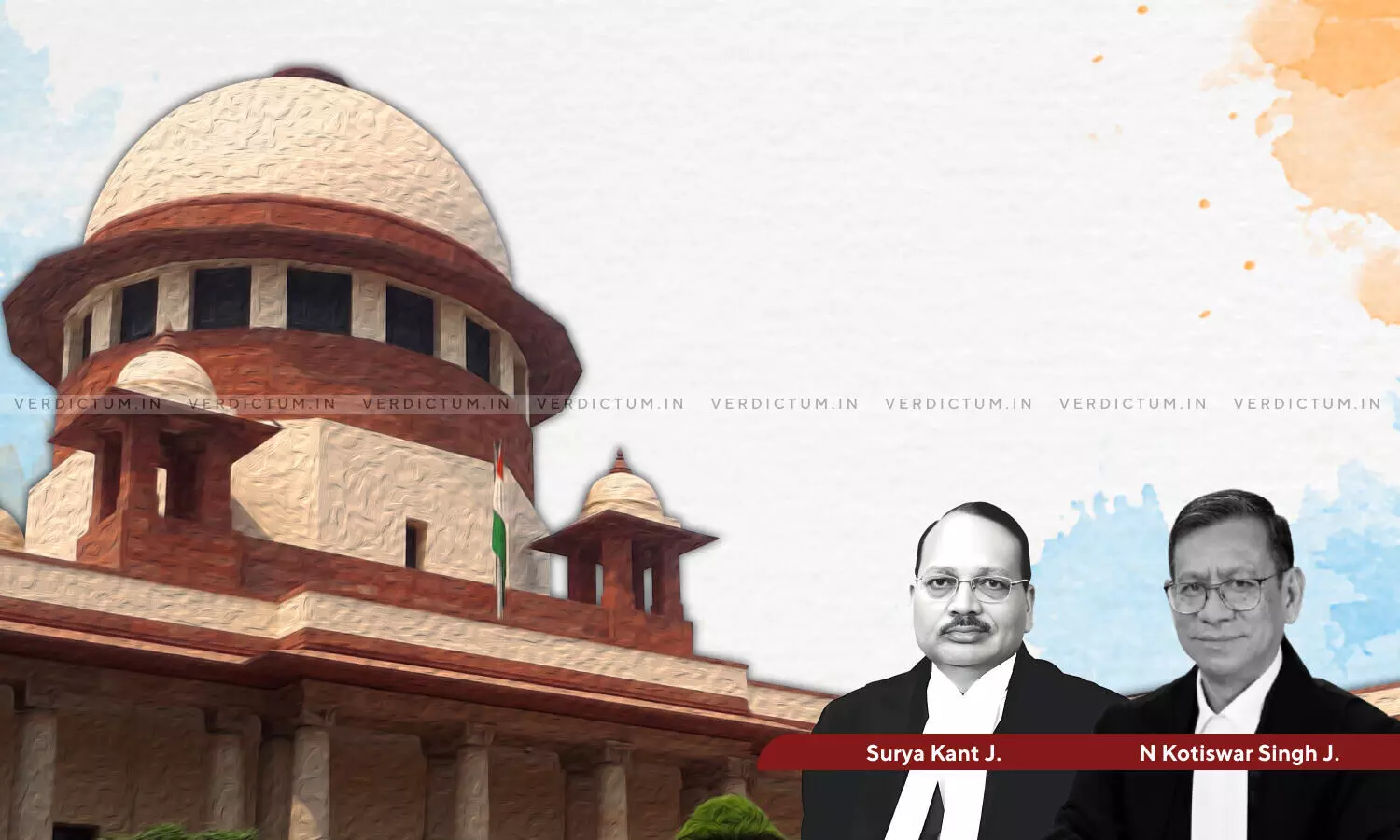
Justice Surya Kant, Justice Nongmeikapam Kotiswar Singh, Supreme Court
Supreme Court: Pensionary Benefit Can’t Be Treated As Pecuniary Advantage Liable To Be Deducted For Computation Of Motor Accident Compensation
 |
|The Supreme Court modified the Order of the Karnataka High Court by enhancing the motor accident compensation awarded to the legal heirs of the Appellant.
The Supreme Court has clarified that pensionary benefit cannot be treated as “pecuniary advantage” liable to be deducted for the purpose of computation of compensation within the scope of Motor Vehicles Act, 1988 (MV Act).
The Court modified the Order of the Karnataka High Court by enhancing the motor accident compensation awarded to the legal heirs of the Appellant. The Court clarified that any amount receivable on account of PF, pension or insurance cannot be deducted from the salary of the victim for the purpose of determining the income or loss of earning for calculating compensation.
A Bench of Justice Surya Kant and Justice Nongmeikapam Kotiswar Singh held that “amount of compensation is to be calculated on the basis of last drawn salary of the injured/deceased in respect of salaried persons and pension and such retirement benefits enjoyed cannot be deducted for computing the income, these being statutory rights receivable by the employee or his legal heirs irrespective of any unforeseen incident of accidents, fatal injuries etc. and such pensionary benefit is not directly relatable to the motor accident. Hence, pensionary benefit could not have been treated as “pecuniary advantage” liable to be deducted for the purpose of computation of compensation within the scope of Motor Vehicles Act, 1988.”
Advocate Rahul Jain represented the Appellant, while Advocate Sandeep Jha appeared for the Respondents.
Brief Facts
The original Appellant, who later died during the pendency of the Appeal, was injured in a collision with a Car, where he suffered serious injuries, including a heart attack, and was eventually discharged from service due to a 61.94% physical disability as certified by a Medical Board.
The Motor Accident Claims Tribunal (MACT) had initially awarded Rs. 3,28,422 as compensation, which was later reconsidered, and the compensation was increased to Rs. 31,64,896. The High Court, in a subsequent Appeal, reduced the compensation to Rs. 27,47,700.
Court’s Reasoning
The Supreme Court clarified that for salaried individuals in motor accident cases, the amount of compensation is to be calculated on the basis of their last drawn salary. Furthermore, pension and retirement benefits received by the injured or deceased cannot be deducted when computing their income for compensation purposes.
“The Tribunal could not have doubted the correctness of the assessment made by the Commissioner and could have accepted the same, yet for a strange reason that there was no material evidence to show that the original appellant was rendered completely incapacitated or that he was doing any job after his discharge from the services, the Tribunal reduced the disability to 50% holding that it would meet the ends of justice,” the Bench remarked.
“In spite of the credibility of the subsequent medical opinion given by the Commissioner as regards the physical disability of the original appellant not being challenged by the Insurance Company, nor being doubted by the Tribunal itself, we see no reason as to why the Tribunal did not accept the same to the effect that the disability was 78%. What we have also noted is that the High Court has treated the physical disability of the original appellant at 61.94%, which was the initial assessment made by the Medical Board, by ignoring the assessment by the Tribunal appointed Commissioner, correctness of which was not doubted even by the Tribunal. No reason has been assigned by the High Court why it chose to accept the assessment of 61.94% disability made by the Medical Board over the subsequent assessment of 78% disability by the Commissioner,” the Court pointed out.
Consequently, the Court ordered, “The appeals are accordingly allowed in the above terms and the common impugned order dated 14.11.2019 passed in MFA No. 3569/2016 and MFA No.4867/2016 by the Karnataka High Court is modified to the extent indicated above.”
Accordingly, the Supreme Court allowed the Appeal.
Cause Title: Hanumantharaju B (Dead) By LR. v. M Akram Pasha & Anr. (Neutral Citation: 2025 INSC 682)
Appearance:
Appellant: AOR Hetu Arora Sethi; Advocate Rahul Jain
Respondents: AOR Binay Kumar Das; Advocates Sandeep Jha, Ram Ekbal Roy, Sanjay Kumar Singh and Ajai Kumar